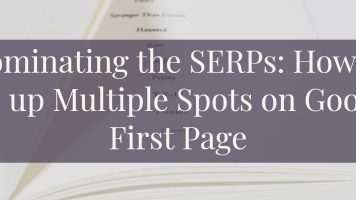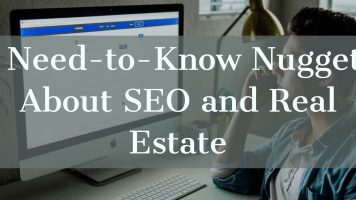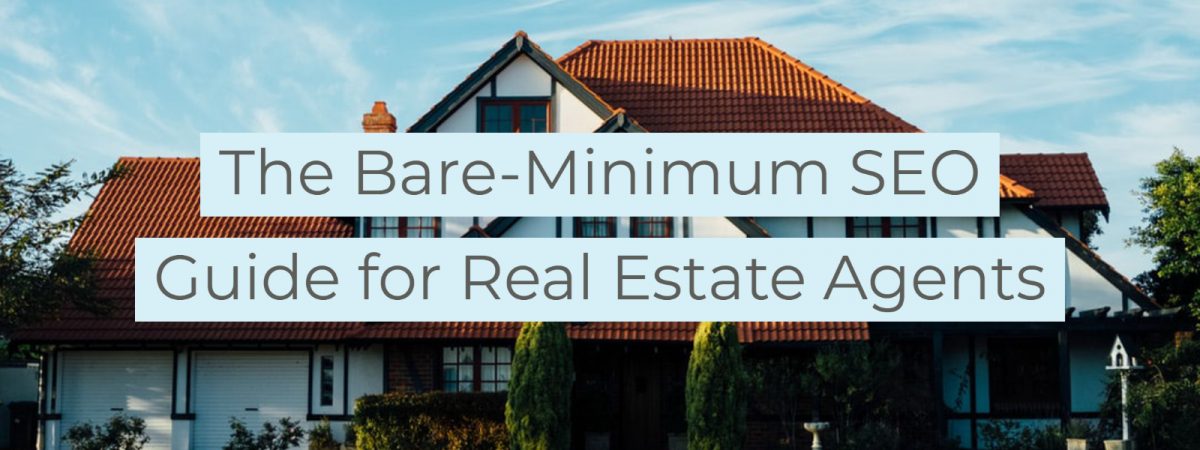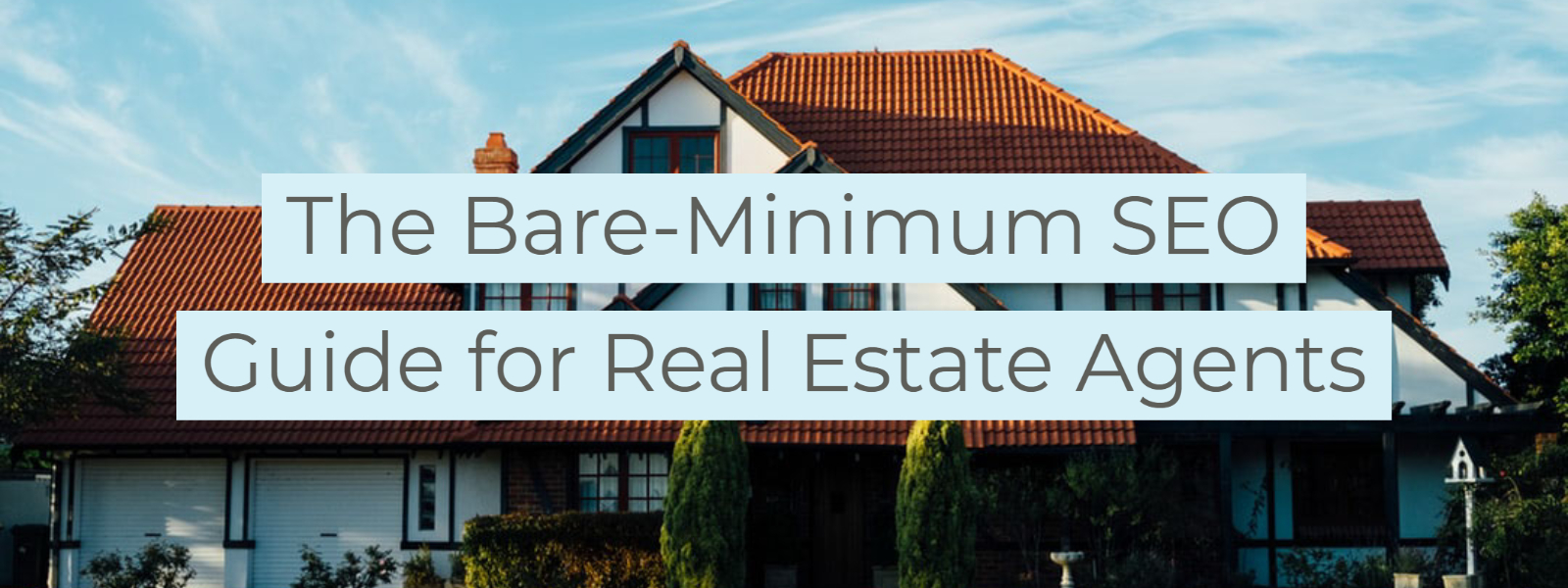The Bare-Minimum SEO Guide for Real Estate Agents
If your real estate business consists of just you or only a small team, you probably shouldn’t be spending tons of time figuring out the intricacies of SEO. But with more and more people turning to the web to search for homes and agents, it’s not something you should be ignoring, either.
This SEO guide was written for those of you who are running a lean and mean real estate business. I’ll share just the essentials of what you need to know, and nothing more. Because you have more important things to do.
In the spirit of being succinct, let’s not waste any more time in getting started.
(FYI, if you are interested in going more in-depth on SEO, I’ll share some of my favorite resources at the end of this post.)
First, some things you need to know about SEO:
What is SEO?
SEO is search engine optimization—the process of improving your business’s visibility in search engines (e.g. Google, Bing, and Yahoo).
You might hear people throw around terms like “local SEO” and “on-page SEO.” Local SEO deals with building your presence on local listings sites like Yelp and Zillow, while on-page SEO is about optimizing content on your own website.
Do I really need to bother with SEO?
Yep. Here’s why:
In September of 2015, The National Association of REALTORS reported that the top 3 first steps home buyers take are:
Looking online for properties for sale (43%)
Contacting an agent (15%)
Looking online for information about the home buying process (12%)
Real estate consumers are turning to the web first, so it’s important to make sure you have a visible online presence.
Beware of shady SEO companies
There are SEO companies out there who will claim they can get your website on page one of Google. Some might be honest…but a lot of them are practicing Black Hat SEO. They’ll stuff your webpages full of awkward keywords, create weird menu items, and write nonsensical blog posts on fake websites that link back to your site. None of these tactics will work, because Google has become smart enough to sniff out spammers.
Authenticity is the key to SEO success. Don’t waste your precious marketing dollars on a shady SEO company. You can do this yourself. (If you do choose to hire an SEO company, make sure it’s a credible one with great references.)
Your SEO To Do List:
Alright, let’s get down to business. Here is your stripped down list of SEO tactics.
1) Manage your Google My Business listing
Google is the most popular search engine, so this is where you should focus your SEO efforts. One of Google’s most valuable features is Google My Business, a free listing for your company that will appear in search results and Google Maps. This listing includes your business name, phone number, address (if you have one), star rating, reviews, website URL, hours of operation, and images.
Your To Dos:
Visit www.google.com/business, click Start Now, and it will walk you through the steps.
Once you’ve created your listing, ask your past clients to leave you a review.
2) Create profiles on other local listings sites, too
Yelp – Find and claim your business page (or, if it doesn’t already exist, create it).
Realtor.com – If you need help, there are instructions here.
Trulia
Zillow
3) Make sure your website is structured for SEO
To be able to optimize your website content, there are some structural elements that must be in place. (If you’re not sure about some of these, ask your web developer.)
- For your IDX, use RETS or FTP (iframe = bad for SEO)
- You should have the ability to update the following elements (these are where you’ll want to place keywords):
- Your blog should be on the same domain as your main website. The URL should look like blog.yourwebsite.com or yourwebsite.com/blog.
- Your website should be responsive (this means it adjusts to fit mobile devices). Check it using Google’s Mobile-Friendly Test.
- Make sure your website is indexed by Google (in other words, make sure Google is acknowledging its existence and that your site will show up in search results). Follow Step 1 of this article by Moz.
1.Page title tag – This is not the actual headline on a webpage, but what appears in the browser tab and in search results.
2.Meta description – This also appears in search results, as the description below the title.
3.H1 header tag – The main headline on a page.
4.Image alt tag – Text that provides search engines with a description of the image.
5.URLs – If you can’t edit them, they should at least be simple and human-readable.
4) Use the right keywords on your website
Once you’ve made sure your website is structured properly, you can start optimizing with keywords.
“Keywords” are the words and phrases that people type into search engines. Your job is to figure out what people are typing into Google when they’re searching for homes, agents, and real estate information…and then to use those keywords on your website. If you’re a real estate agent in Seattle, for example, you might want to include keywords like “Seattle real estate” and “homes for sale in Seattle” on your website.
Your To Dos:
Create a list of keywords that best describe your services. These should be phrased the way your prospects would phrase them.
Choose one keyword to focus on for each of your web pages. Use that keyword in the SEO hot spots: page title tag, H1 header tag, and URL.
Don’t cram in keywords where they feel unnatural. Write for people first, search engines second.
5) Create useful, valuable content
Allow me to reiterate that last point…write for people first, search engines second. This is one of the most important things to understand about SEO.
The goal here isn’t to outsmart Google. You see, Google’s main objective is to provide searchers with awesome answers to their queries. So your best bet is to write awesome content that Google will want to deliver to searchers. Focus on writing for your audience first. The other stuff—keywords, title tags, etc.—is just how you can help Google connect searchers with your content.
So, what kind of content should you be creating?
When homebuyers and sellers are in the very early stages of the process, many of them are doing online research, searching things like when is the best time to put my house on the market or what are closing costs. You can capitalize on this behavior by providing the answers in a blog post or on a web page.
Your To Dos:
- Make a list of questions you’ve had more than one client or lead ask. (You can also check out our list of blog topic ideas for real estate agents.)
- Write a blog post answering each question.
- Publish on a regular schedule (ideally, at least once a week).
- (While you’re at it, promote your content on your social media accounts and via email.)
6) Create links
Links fall into three categories:
- Internal: Links on your site that connect to other pages on your site.
- Outbound: Links on your site that connect to outside, third-party websites.
- Inbound: Links on other websites connecting back to your site.
Your To Dos:
- Create internal links – On each of your webpages, look for opportunities to create links to other pages on your site. Don’t force it, though; it should feel natural.
- Create outbound links – Create links from your content to other websites’ content. Make sure they are credible, high value sites. Again, these links shouldn’t feel forced; they should add more value to your content.
- Create inbound links – This one is tougher, because you have less control. Guest blogging is one great way to create inbound links back to your site. For more ideas, check out this list of link building tactics by Point Blank SEO.
7) Post to social media
With social media, your main objective isn’t really SEO. It’s more about connecting with people and building relationships. It’s also a great platform for promoting your content.
However, there have been reports that creating social profiles for your brand helps Google better understand that your name is connected with your real estate business. Posting your content to social media might also create valuable backlinks…maybe.
Pinterest probably has the most SEO benefits. Pinterest boards often appear at the top of Google search results, and there’s certainly a demand for homeownership-related content on this social network.




